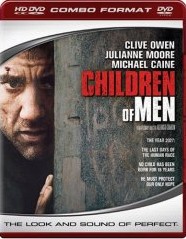See the movie before reading the book!
The movie is more vivid and fast-paced than the book.
The book is very thoughtful and helps you mull over and argue with some of the ways it was interpreted
in the film.
They both show ways that society falls apart.
They explore what happens to society when it has no future.
|
|
Book:
The Children of Men
by P. D. James.
P. D. James said:
"I thought, if there was no future, how would we behave?"
P. D. James said:
"The detective novel affirms our belief in a rational universe because, at
the end, the mystery is solved. In The Children of Men there is no such
comforting resolution."
|

|
|
|
|
|
| Year:
| Book published 1992; story set in 2021.
No human children born since 1995, the "Year Omega"
(3 years after book publication.)
| Movie released 2006; story set in 2027.
No human children born since 2009
(3 years after movie release.)
|
| Believable:
| The ending of the book is much less optimistic but more believable than the end of the movie.
The "Quietus" in the book is a much less believable way of death than in the movie.
| The ending of the movie is much more dramatic and romanticized than in the book.
|
| Breakdown of society:
| Somewhat subtle.
| Dramatic and clear.
|
| Dystopia; fascism; police state:
| Relatively subtle.
| Dramatic and clear.
|
| Infertility:
| Male infertility; human sperm-count zeroed out.
| Female infertility.
|
| Omegas: those born in the last year of fertility:
| Native Omegas are perceived as beautiful and powerful; given special rights.
But "Sojourners" (foreign Omegas and other healthy young people)
are imported for serving and caring work.
| Perceived as aggrieved and protesting; Xan's son is probably an Omega and appears clever and detached
(perhaps autistic and perhaps only childishly rebellious).
|
| Telling touches:
| Childless women push dolls in prams;
women treat the birth of a kitten as cause for the kind of celebration that used to attend
a child's birth;
couples arrange a christening ceremony for their new-born kitten.
| The cages of deportees and refugees ("fugees"); the torture; the military; the squalor.
|
| Theo:
| Dr. Theodore Faron, an Oxford don and historian. He accidentally killed his one child, a daughter, Natalie.
Separated from his wife a few of years previously (and after that accident).
| Skiving minor bureaucrat and alcoholic in the Ministry of Energy.
Previously had been an activist with Julian, but has become apathetic.
His child (a son, Dylan) died during a flu epidemic.
[Here, as elsewhere, the film casts Theo in a more sympathetic and less ambiguous light than the book.]
Clive Owen plays Theo.
|
| Xan Lyppiatt (competitive cousin to Theo):
| The "Warden of England" seized the dictatorship
with energy and vision, in a pessimistic and apathetic society.
Used Theo as an official adviser (until Theo left, feeling insufficiently powerful).
Xan:
"Have you ever known anyone to give up power, real power?"
| An oddly detached character, still Theo's cousin (as in the book) but with a different name ("Nigel")
and a less powerful position (a government minister who guides the collection and reconstruction of "rescued" (scavenged?)
shattered great art of Europe). This role-change obliterates the opportunity that the book offers for a meditation
on the seduction of power.
|
| Julian:
| A bright and attractive young woman in the Five Fishes revolutionary group;
she asks Theo to get her an audience with his cousin, Xan, the "Warden of England".
[Theo's estranged wife is called Helen; Theo accidentally killed their one child.]
| Theo's estranged wife; their child died some years previously, due to disease.
Julian leads the Five Fishes; Theo had been a revolutionary with Julian when they were younger.
Julianne Moore plays Julian.
|
| Jasper:
| A retired harsh Oxford don. Theo had been a favorite student.
| An aged hippie journalist and editorial
cartoonist; surrogate father to Theo; possibly related (perhaps father?) to Julian.
Grows cannabis and cares for his wife, a former photojournalist, catatonic due to tortured (perhaps by the government's MI5,
analagous to the CIA).
Michael Caine plays Jasper.
|
| The child:
| A boy (not a girl as Julian had thought).
Implies that male infertility is solved.
| A girl.
Implies that female infertility is solved.
|
| The child's mother:
| Julian.
| Kee (a character added by the film)
|
| Redemptive end:
| Dubious. Theo puts on the Coronation Ring (worn by the now-dead Xan, whom he killed);
the ring symbolized the Warden's power;
apparently he intends to use the child and mother to consolidate his power.
| Yes. Theo saves child and mother, putting them in touch with a better society.
|

